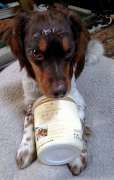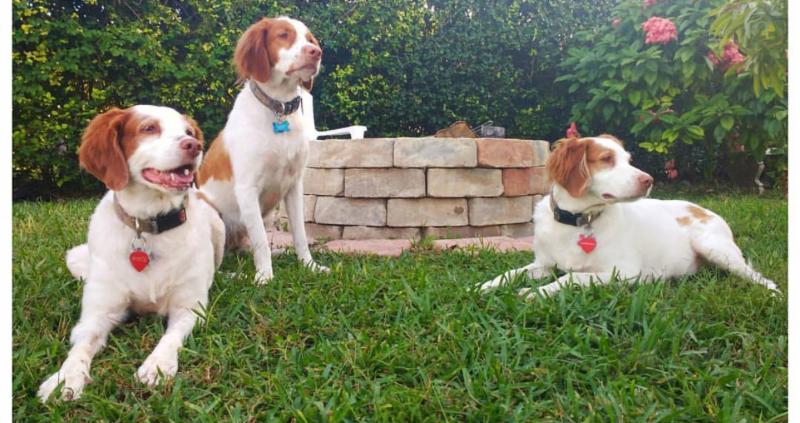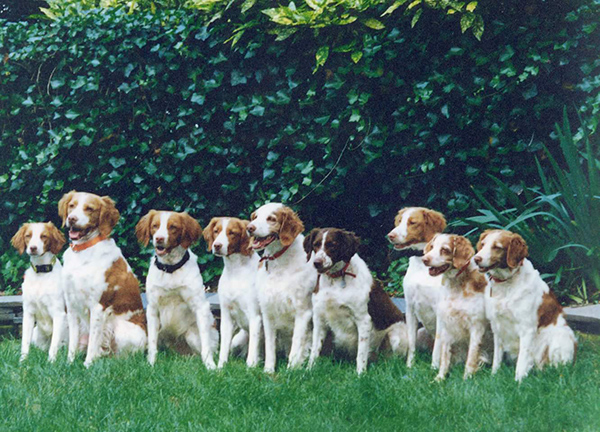ABR QUILT RAFFLE
Tickets available now!!!
For several years, Mariann Jackson has handcrafted a unique and original design quilt to be raffled for American Brittany Rescue. The 2017 design was created by Lucy Harwell Duncan. This year's quit is 52X38 and has hanging strips for displaying the quilt. You can purchase tickets at www.americanbrittanyrescue.org.
Each raffle ticket is $5. The raffle closes on November 1st, 2017 and the drawing will take place at American Brittany Club Nationals on November 18th, 2017.
Support ABR through this popular fundraiser!
|
American Brittany Club National Specialty
November 15th-19th, 2017
Location
: State Fair Park -- Kay Rodgers Park - Expo Center 4400 Midland Boulevard, Fort Smith, AR
|
| HEALTH NOTES WITH DR. HEATHER |
|
September is National Disaster Preparedness Month. Hurricane Harvey, Hurricane Irma, and abundant wildfires this summer remind us that being prepared for the worst is not an abstract concept, but an important reality to face. Being prepared for your furry family can empower you to possibly prevent a tragedy.
As a pet owner making your own disaster plan can help save your life and the lives of your animals. Have clear identification on your pet such as a visible tag and collar, permanent identification such as a microchip, and a recent photo to help identify your dog if you get separated.
Have an emergency supply kit including food, water, vaccine history, leash, harness, crate, newspapers, poop bags, blanket, and an animal first aid kit.
Make a safe haven plan, including knowing a route and a place to go ahead of time. A list of kennels, pet friendly hotels, or a family member out of the immediate area may be able to help. Most shelters cannot take pets but many are prepared to help you find a place for your pet. The better prepared you are the better rescue workers can help you and your dog.
If you cannot evacuate find a safe room and don't allow your pets to roam.
We all hope to never be in these situations but a little planning can help decrease tragedy when disaster strikes.
References:
|
HOW TO HELP ANIMALS AFFECTED BY HURRICANE HARVEY
Credit given to www.dogster.com for all information outlined below.
|
|
With Houston being one of the hardest hit areas by the storm, Houston SPCA is currently operating with a skeleton staff of folks able to safely make their way to the shelter.
This shelter is currently housing at least 19 pets for owners with no other place to leave them, as well as a couple dozen strays, with hundreds more expected in the coming days and weeks. The cost for current intakes alone has topped $25,000 (for staff, supplies, vaccinations, housing, etc.).
Safe from the harm of hurricane weather, this facility has transported over 330 animals already and expects to take in hundreds more
This amazing, unique animal rescue has chartered several flights already to evacuate homeless animals from the San Antonio area to make room for the influx of lost and surrendered pets to come.
This St. Louis-area organization has reportedly taken in 90 dogs and cats already, to make room for incoming hurricane strays.
Not safely out of the storm's path themselves, this shelter transported over 100 animals to
Greater Birmingham Humane Society to make room for local needs post-storm. It has also coordinated airlift missions to send animals to emergency intake partners in Maryland, Pennsylvania and Virginia.
Old hands at helping its friends in the south, with rescue experience after Hurricane Katrina and the Oklahoma tornadoes, PAWS Chicago did a trip ahead of the storm to bring 26 ready-to-be-adopted cats and dogs to Chicago.
The expertly trained search and rescue crew of this group have deployed with a fleet of boats and trailers to assist with emergency rescues in Beaumont and Jefferson County areas.
With a team trained for natural disaster and extreme rescue situations, animals of all kinds are in good hands when rescued by this group.
At the forefront of the Hurricane Katrina rescue efforts, and largely responsible for the passing of subsequent legislation protecting pets in times of emergency evacuation, it's no surprise the Humane Society of the United States is well-prepared to assist before, during and after Hurricane Harvey.
Supporting not only dogs, but
cats too, The AKC Humane Fund has donated $10,000 to the city of Houston and deployed an AKC Pet Disaster Relief trailer to hurricane-stricken areas.
The Greater Good Rescue Bank delivered pallets of cat and dog food and supplies to the The George R. Brown Convention Center in Houston, Texas - where families were allowed to seek shelter with pets of all species. It also supplied medical supplies and vetting for animals being evacuated to make room for the influx of lost/found pets.
This shelter has taken in over 1,000 found cats and dogs in the wake of Hurricane Harvey.
As an emergency intake partner of the Humane Society of the United States, Seattle Humane was prepared to take in up to 100 dogs and 200 cats from the Houston area in order to make room for incoming rescues post-hurricane in the Texas area.
After assessing needs with the Anti-Cruelty Society in Texas, this Chicagoland rescue determined which cats were most in need of help and had 22 felines airlifted out of danger's way, to find them forever homes in the Midwest.
This organization is on the ground in Houston helping animals.
Please note ABR does not endorse any of the above organizations and that you should research any organization prior to donating to ensure how your gift is used.
|
|
While hurricanes have dominated the news, we can not forget the wildfires in the west. The states with major fires are California, Oregon, Washington, Idaho, and Montana. Many of these states have local animal rescues that are in need. In general, here are some ways to help immediately:
Adopt - Now is a good as time as any, because it helps free space for temporarily housing fire evacuee pets. Many shelters and rescues have reduced adoption fees.
Donate Supplies - Extra supplies are needed to assist shelters and rescue organizations help wildfire communities. You can help by donating any of the following items: Blankets, toys, dog treats, peanut butter, harnesses & leashes.
Volunteer - If you are located near an area affected by wildfires consider volunteering at a shelter to help with enrichment for shelter pets and evacuee pets.
Contribute - Most local rescue groups and shelter are assisting right now, but it is costly, any monetary gift will help continue their efforts.
(Please do your research before giving.)
If you have a shelter or rescue group that you know is doing great work to assist the victims of the wildfires, please email [email protected] and we will feature the shelter or rescue group in our next eNewsletter.
|
Maicy, Savannah and Jack (Irma Evacuees) and damage from their neighborhood.
|
|
 |
|
"Rescuing one dog will not change the world.... But for that dog the world will be forever changed."
These wonderful Brittanys are currently available for adoption.
 Captain (California):
Captain (California):
Captain is well mannered, housebroken, crate trained, rides well in the car, gets along with other dogs and is eager to please. His first choice is to sleep in bed with you or snuggle on the sofa but also complies when his requests are denied. The many people who have met Captain remark how good natured he is and given his love for people he should be in a home as part of the family.
 Meadow (New Jersey):
Meadow (New Jersey):
This 1-year-old cuddly, playful sweetheart loves people,
cats and dogs. She has some special needs requiring just a little extra guida
nce from
her family, but she is a truly amazing companion and will crawl into your
heart forever!

This lovable goofball adores people, chewies, a good tug match,
and car
rides! 6-year-old Ace is happy and healthy, and all he needs now is his f
orever
family.
2-year old Ordo, a rescue from Spain, loves cuddles and walks! He's a little shy, but with time and patience, this sweet little boy is coming out of his shell and learning that life in America is great!
 CLICK HERE FOR A FULL LIST OF AVAILABLE DOGS...Â
|
Preparing for Natural Disaster:
ABR Volunteer Shares Tips after Enduring Irma with her Three Brittanys
|
Longtime ABR volunteer Cheryl Lopez
lives in the suburbs of Miami with her three Brittanys, Maicy, Savannah and Jack.
After hurricane Irma, we were beyond relieved to hear that Cheryl, her family, and her dogs were safe.

With time to prepare, Cheryl armed herself with knowledge and supplies, which were key to keeping them all safe through the storm. Through the experience, Cheryl also encountered some challenges she hadn't anticipated.
Cheryl shares
these tips to help all pet parents prepare for unforeseen emergencies:
-
No matt
er where you are located,
take steps now to prepare
for an emergency. Cheryl was fortunate to have some time to prepare, but you never know when you will be forced to leave your home in an emergency.
(Take Dr. Heather's information to heart!)
-
Know your local government and shelters.
More
and more
pet-friendly shelters are opening, but they all
have different rules
.
Keep a list of pet-friendly emergency boarding facilities
in your area
.
Find out whether animals need to come in crates and whether they need vaccination records. Make sure you have enough crates for all your animals on hand.
-
Keep vaccination records in an easily accessible file
.
You know you have them... somewhere....
You don't want to be scrambling for paperwo
rk in the midst of an emergency!
-
Keep an extra supply of dog food on hand.
Cheryl had the
challenge
of
getting bag
s
of dog food
one
week ahead of time
. With everyone hurrying to buy extra,
stores were out of stock.
-
Have enough water on hand for yourself and your animals.
S
ome places
in Florida
were on boiled water order for a week
.
During power outages, water can be shut off
completely, and when
water handouts are given, they are rationed for people but not animals.
Have plenty of extra bottled water on hand for everyone.
-
Prepare for dogs who are fearful of storms and loud noises.
In addition to the thunder and wind the hurricane brought, the dogs could sense Cheryl's anxiety.
T
hey fared well, but for
many
dogs, it
was likely
an especially stressful few days.
Make sure you have on hand whatever works for your dog-calming treats, extra regular treats, Thundershirts, and always plenty of patience and love!
-
Have pee pads on hand.
One of Cheryl's biggest challenges was allowing the dogs to relieve themselves. The dogs could not get outside from 11:00pm until 4:00pm the following day because the wind and lightening were too dangerous. She put towels down in the garage, but the dogs wouldn't go
on them.
They were scratching at the doors and crying to go out. Finally she put the towels in the kitchen and left them in the room alone,
realizing
they didn't want to go in the house
but
especially not in her presence. Two of the
dogs
finally
went, but one held it for the entire storm. Cheryl wished she had pee pads
that
are scented to attract the dogs.
-
Educate yourself about
carbon monoxide poisoning risks.
In hurricanes, winter storms, earthquakes, and other emergencies when power outages occur, people often turn to alternative sources to heat, cook and provide power to the home. Carbon monoxide is colorless, tasteless, and odorless, and when it builds up in enclosed or semi-enclosed spaces, it can cause poisoning that can be fatal to humans and animals
.
-
After the storm, survey the outside area before letting your dogs out without a leash.
Fences could be gone or damaged. Cheryl found broken glass and debris in her yard.
Cheryl and the pups thankfully came through hurr
i
cane Irma without any problems. We hope her tips help our entire ABR family stay prepared and safe!
|
Please tell us about organizations and rescues that are assisting the animal victims of Irma and Maria. We would like to feature those organizations in our next enewsletter. Please submit to
[email protected]
|
|
Questions & Answers from our ABR Community
|
|
Dear Brittany,
We all know Brittanys are energetic. With the bad weather, I have been stuck inside with our Brittany. The KONG only lasted 20 minutes. What are some other ideas to engage my dog when we are stuck inside?
Thanks,
Having Cabin Fever
|
If you have a remedy, trick, or just advice for our Dear Brittany question, please submit it to
[email protected]
Answers will be share in the next issue of our enewsletter, so share your thoughts and connect with the ABR community.
Opportunity
Are you an artist or graphic designer? If so, we would love to have an image for the Dear Brittany section. Please submit entries to [email protected] for consideration.
|

Congratulations to these Brittanys who joined their forever families over the last month!
Asher, IL
Bruno, WV
Cinch, IL
Curly, IA
Freckles, GA
Grace, NJ
Hunter, IL
Jojo, IA
Kobe, DE
Louie, CA
|
Lily, NJ
Max, PA
Minnie, IL
Missy, ID
Nash, GA
Parker, CA
Penny Lane, OR
Sebastian, IA
Sky, GA
|
|
|
PET FOOD ALTERNATIVES FOR LONG-TERM EMERGENCIES
|
"In a long-term emergency we want our entire family to thrive, and that includes our beloved pets.
To keep these animals healthy, keep their needs in mind when making your emergency preparations. Due to the cost of pet food, storing dry food is preferred over storing the wet food. When storing dry goods for dogs and cats, look for dry food that does not have a lot of oils in them; as the oils can make the food go rancid more quickly.
Stockpiled pet food will only last for so long. What's a pet owner to do when the kibble supply runs dry?
Making your own pet food is a more financially reasonable option for some. The cost is actually comparable to the price of kibble, and the nutrition content of homemade pet food is far higher.
Creating pet food is not so much about having the recipe to do so - it's about knowing the proper ratios for optimum nutrition for your pet. The following information is geared towards healthy adult pets without special dietary needs.
Doggie Dinner Delights
The canine digestive system is a little less delicate than other furry friends and the ratio is simple:
1 part meat
1 part grain
1 part veggies
Broccoli, spinach, celery, carrots, peas, and green beans are favorite veggies among canines. Keep in mind that some vegetables are more difficult to digest than others. Dogs may have a harder time digesting broccoli, cabbage, cauliflower, and Brussels sprouts. Avocados, tomatoes, and wild mushrooms should be avoided as they are potentially harmful.
I cook my dog food all together on the stove top (we refer to it as "dog stew". I make a broth from leftover chicken carcasses, etc, and use it for the base. I use grains from my stockpile, like rice and oats, and generally use canned vegetables. Peas and carrots are a special favorite of the pooches in our house.
I include the skin when cooking the meat for the dogs as well. As with cats, the addition of some bone meal is very important. Since bones are something that would generally be thrown out, I appreciate finding a use for them in the name of less waste. Don't forget the addition of a healthy fat, like whole eggs or olive oil!
It's All About the Ratios
Now that you know the basic ratios for good nutrition for your pets, you can use foods that you have in your stockpile/freezer to feed your pets. You may find that your grocery bills drop as you find ways to use less expensive cuts of meat and last day of sale items to feed your pets!
When making your homemade pet food, it's an excellent time to add supplements like vitamin drops, brewer's yeast and garlic to keep your pets healthy and parasite-free.
Once you've started feeding your pets these homemade nutritious foods, you will notice a lovely glowing coat and far more energy. The nutrition level and lack of preservatives will benefit their health while benefitting your wallet!"
Tess Pennington is the author of
The Prepper's Blueprint, a comprehensive guide that uses real-life scenarios to help you prepare for any disaster.
Tess is also the author of the highly rated
Prepper's Cookbook
, which helps you to create a plan for stocking, organizing and maintaining a proper emergency food supply and includes over 300 recipes for nutritious, delicious, life-saving meals.
|
|
|